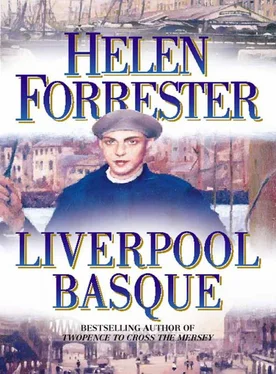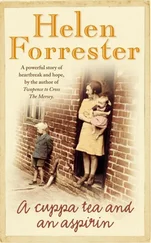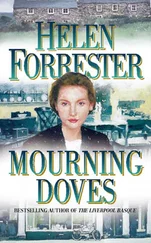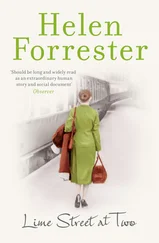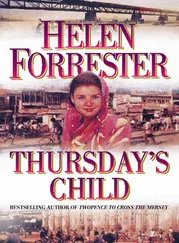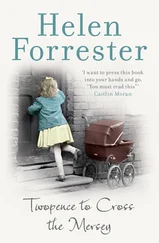HELEN FORRESTER
The Liverpool Basque
This novel is entirely a work of fiction. The names, characters and incidents portrayed in it are the work of the author’s imagination. Any resemblance to actual persons, living or dead, events or localities is entirely coincidental.
Harper
HarperCollins Publishers Ltd. 1 London Bridge Street London SE1 9GF
www.harpercollins.co.uk
First published in Great Britain by HarperCollins Publishers 1993
Copyright © Helen Forrester 1993
The Author asserts the moral right tobe identified as the author of this work
All rights reserved under International and Pan-American Copyright Conventions. By payment of the required fees, you have been granted the nonexclusive, nontransferable right to access and read the text of this ebook on screen. No part of this text may be reproduced, transmitted, downloaded, decompiled, reverse engineered, or stored in or introduced into any information storage and retrieval system, in any form or by any means, whether electronic or mechanical, now known or hereinafter invented, without the express written permission of HarperCollins ebooks
This book is sold subject to the condition that it shall not, by way of trade or otherwise, be lent, re-sold, hired out or otherwise circulated without the publisher’s prior consent in any form of binding or cover other than that in which it is published and without a similar condition including this condition being imposed on the subsequent purchaser
HarperCollins Publishers has made every reasonable effort to ensure that any picture content and written content in this ebook has been included or removed in accordance with the contractual and technological constraints in operation at the time of publication
Source ISBN: 9780006473343
Ebook Edition © DECEMBER 2012 ISBN 9780007392162
Version: 2016-08-26
This novel is dedicated to my friend,Doroteo Vicente Elordieta, a Basque from Liverpool,whose wonderful stories about the cityinspired me to write it
Just as the twig is bent the tree’s inclined
Epistle i, line 149
Moral Essays
Alexander Pope, 1688–1744
Cover
Title Page
Copyright
Dedication
Epigraph
Chapter One
Chapter Two
Chapter Three
Chapter Four
Chapter Five
Chapter Six
Chapter Seven
Chapter Eight
Chapter Nine
Chapter Ten
Chapter Eleven
Chapter Twelve
Chapter Thirteen
Chapter Fourteen
Chapter Fifteen
Chapter Sixteen
Chapter Seventeen
Chapter Eighteen
Chapter Nineteen
Chapter Twenty
Chapter Twenty-one
Chapter Twenty-two
Chapter Twenty-three
Chapter Twenty-four
Chapter Twenty-five
Chapter Twenty-six
Chapter Twenty-seven
Chapter Twenty-eight
Chapter Twenty-nine
Chapter Thirty
Chapter Thirty-one
Chapter Thirty-two
Chapter Thirty-three
Chapter Thirty-four
Chapter Thirty-five
Chapter Thirty-six
Chapter Thirty-seven
Chapter Thirty-eight
Chapter Thirty-nine
Chapter Forty
Chapter Forty-one
Chapter Forty-two
Chapter Forty-three
Chapter Forty-four
Chapter Forty-five
Chapter Forty-six
Chapter Forty-seven
Chapter Forty-eight
Chapter Forty-nine
Chapter Fifty
Keep Reading
Selective Bibliography
About the Author
Author’s Note
Other Works
About the Publisher
Ignoring the pouring rain, he came out of the house, and then turned to check that the front door had closed properly behind him. Satisfied, he walked slowly down the path between the flowerbeds, empty except for a few winter aconites cautiously beginning to open.
When he reached the two steps which led down to the pavement, he paused before carefully descending them. As the wind off the Strait caught him, his shiny black oilskin flapped against his lean frame. A fringe of white hair fluttered round the edge of the black beret set firmly on his head; the beret had been arranged so that it had a small peak to protect his forehead and encourage the rain to fall down his cheeks instead of veiling his sight.
Safely on the narrow pavement, he lingered for a moment to look across the Juan de Fuca Strait. The Olympic Mountains were obliterated by the downpour, but nearer to hand a freighter was stubbornly butting its way through the sheeting rain towards Victoria Harbour. With a seaman’s eye for weather, he looked up at the louring clouds, pursed his lips and muttered, ‘Cold enough for snow.’
Water was trickling down his neck, so he heaved his collar up higher and then proceeded along The Esplanade towards the cemetery. He walked with his head bent, his shoulders slightly hunched, as if expecting to hit his skull on a door frame if he straightened up. Though his gait was light and steady, his old Wellington boots made an intermittent squishing sound as he slopped through muddy puddles.
In the large inside pocket of his oilskin was a single pink rose wrapped in damp tissue paper. He had bought it yesterday from the florist in Cook Street; throughout the winter he had a standing order with her, to purchase the flowers four at a time. He kept them fresh in a cut-glass vase on the dining-room table, and, regardless of the weather, he took one each day to the cemetery to lay on the grave of his wife, Kathleen.
Sometimes the florist was not able to obtain the pink or white blooms which he requested, and he would have to make do with red ones, which Kathleen had not loved quite so much. In summer, he cut roses in shades of pink or cream from the bushes which she herself had planted in their garden when first they had retired to Vancouver Island. While she had the strength, she had tenderly pruned and fertilized them herself. Then, when she had begun to fail, he had pushed her wheelchair on to the lawn, and had learned to look after them for her, doing his best to hide from her the agony of mind he had felt, as he watched her suffer the multiple infections to which leukaemia laid her open.
Seamen don’t get much chance to garden, he ruminated, as he gazed down at yesterday’s offering, which lay, tattered and sodden, on the grave in front of the memorial stone. But Kathleen had loved her garden, and every day he made this small pilgrimage to tell her that he was caring for it and for her household icons, and that he loved her still. Mostly, however, he came to ask her forgiveness for having failed, when she was so ill, to keep her out of pain. Mixed with the rain, tears ran down his face; no matter how the years since her death rolled along, they failed to obliterate from his mind the torture he had watched her endure. There were, of course, days when he took the walk to the cemetery from force of habit; but all too often he went in the hope of easing his own haunting memories. Today, his nightmare was very close.
He bent down carefully to avoid the dizziness which, nowadays, sometimes bothered him, and picked up yesterday’s battered bloom. Regardless of its wet condition, he stuffed it into his outside pocket. His chest felt tight, and he paused to take a few short breaths of the cold, damp air, before slowly opening his oilskin to retrieve the slightly flattened fresh rose from his inner pocket. He unrolled the tissue paper from it and laid the flower in front of the headstone. The wind was strong and capricious, so he picked up a small rock and laid it on the stalk to hold it down. Most people had a vase into which they put their flower offerings, but he laid them on the ground; in his mind’s eye he always saw the roses as lying between his wife’s perfect white breasts.
Читать дальше
